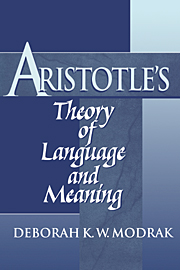6 - Logos as Substance
Published online by Cambridge University Press: 16 November 2009
Summary
The ontological requirements of language and knowledge, as Aristotle understands them, are such that enduring characteristics of mutable and transient individuals are needed. This prompts Aristotle to identify forms, in contrast to concrete particulars, with primary substance in the central books of the Metaphysics and to develop an account of the relation between form and matter that is informed at every stage by a concern with linguistic definition and a conception of essence as the exemplary object of knowledge. A crucial concept in this effort to knit together several objectives is λόγоζ (logos). The term logos is used by Aristotle in many contexts and for many things, from strings of symbols to forms, from speech to definition. In Metaphysics VII, Aristotle exploits the ambiguity of logos to display the common feature of a thought and its referent in the world. The logos actualized in matter is a composite substance, and the same logos realized in thought is a meaning. This is a puzzling doctrine but also by this point in our inquiry a familiar one. Not only does Aristotle assign logos both an ontological role and a linguistic one, he also uses horismos (definition in the strict sense) and pathema (vehicle of meaning) to indicate linguistic items and ontological ones. The real definition is a feature of the world, not just a specification of a meaning; the pathema is both a state of mind and its content (a meaning).
At every stage, the description of ontology is guided by the requirement of rational accessibility. Not only must the ontology be intelligible from a theoretical perspective, it must be accessible at the pre-theoretical level of perception and ordinary language.
- Type
- Chapter
- Information
- Aristotle's Theory of Language and Meaning , pp. 175 - 216Publisher: Cambridge University PressPrint publication year: 2000



